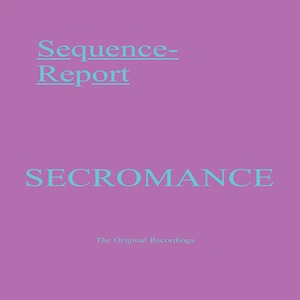Sequence Report Secromance
Tevo Howard is a welcoming producer. Listeners don’t have to have much of a background […]

Tevo Howard is a welcoming producer. Listeners don’t have to have much of a background listening to the Detroit-infused Chicago house he makes to get what he’s up to. As with his last LP, Pandora’s Box, his new electro offshoot Sequence Report just rains down pleasure, irrespective of the genre or lineage he’s working within or making reference to. A musicologist could probably make short work of describing why his music hits so effectively—perhaps it’s some kind of chordal anomaly. But that explanation would fail to take account of the way he unfailingly makes space for the listener in a genre that is generally known for its deference to history and its insider references.
The elements making up Howard’s debut LP as Sequence Report, Secromance, are immediately recognizable. The flighty sounds here are close relatives to the ones that make up his unique take on house, although they’re a bit more sonically liberated, fluttering against windows that open up onto the wider world. The biggest distinction apart from the boom-bap underpinnings are the robotized, Mac OS voices, whose rigid exhortations run a tight but meaningful gamut between the alienated and the unexpectedly poetic. Nowhere is the distinction clearer than between album opener “Emotion Number 8,” which helpfully categorizes its heartbreak, and “Been Steppin’ to Your Love,” which speaks quite ominously of stepping into “the shadow of your beautiful mind.” These are only the most successful examples of Howard’s ability to humanize these unlikely, abrupt blurts of human-emulating data. Without intending it, Howard’s way with these voices comes across as a brisk slap to coldwave’s fetish for anhedonic female voices. There’s less deliberate inflection in the “singing” here, such as it is, than even the most unflappable bedroom synth enthusiast could muster. Counterintuitively, it’s extremely emotionally resonant.
In addition to the busy drum patterns and those android voices, a big part of Secromance is its organ tones, which bonelessly merge into an ecstatic, boundless fog above the individual hits. Even listeners with a cursory familiarity with Howard’s other music might recognize these quasi-drones, as they provide a pulsing, human messiness that ties everything together. Even Howard’s best-laid arpeggios—and he’s a master in that particular realm—get turned inside out into a keening, piping mess of purple tones. On “Possession,” it’s as if Howard is casting hooks into the sky, with every upstart gurgle of organ bouncing back down to the foundation. There are even occult indications of a secret 4AD fetish; the watery, guitar-like tones on “Beauty to Body Count” drive the song as though it were some lost Clan of Xymox experiment. Without straying very far from a basic electro template, Howard injects an unusual—well, unusual for anyone other than him—amount of energy and relatability into a bare-bones concept. In the process, he traverses a huge amount of stylistic and emotional terrain without straying very far from home.

